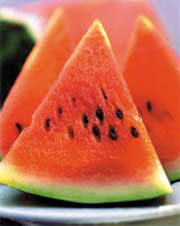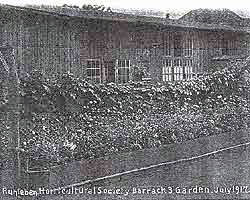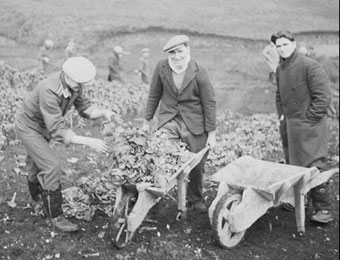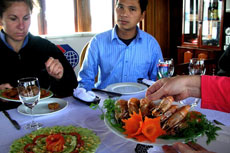Human Flower Project
Monday, May 01, 2006
The Garden at Camp Iguana
With seeds from the mess hall and plastic spoons, detainees at Guantanamo Bay are gardening.
 Photo: Harun Yahya
Photo: Harun Yahya
The best gardening story of the Spring comes from behind barbed wire, via Boston lawyer P. Sabin Willett.
Willet is working to defend prisoners the U.S. has locked up at Guantanamo, Cuba. These are the forgotten ones of the Iraq War. Some, like Willet’s client Saddiq Ahmad Turkistani, were cleared of any charges by the military “long ago” but remain in prison. These men are denied their freedom and even such bits of humanity as “newspapers, visits from loved ones, English dictionaries — and flowers.” Willet, who reported taking a bouquet to Saddiq recently, writes that the inmate “likes to draw roses and often asks for gardening magazines.”
Willet and others have also been trying to gain gardening privileges for the men at Camp Iguana, a low-security facility. The request was denied.
But, we learn, Saddiq and his fellow inmates have managed a tiny garden nonetheless. “We have some small plants — watermelon, peppers, garlic, cantaloupe. No fruit yet. There’s a lemon tree about two inches tall, though it’s not doing well,” Saddiq told his lawyer.
The inmates literally scratched out a plot in the hard soil of the prison yard. “At night we poured water on the ground. In the morning, we pounded it with the mop handle and scratched it,” with plastic spoons. “The next day, we did it again. And so on until we had a bed for planting…. We have lots of time, here.”
Seeds? They were saved from mealtimes when the prisoners were fortunate enough to find bits of fresh fruit on their dinner trays.
Andrew Buncombe, picking up the story for the Independent, writes more about this remarkable gardener:
“An ethnic Uighur who was living in Afghanistan, (Saddiq) had been jailed by the Taliban for three years and then freed by the Washington-backed Northern Alliance in late 2001 before being transferred to US custody. Last year, Mr. Turkistani, who was born and raised in Saudi Arabia, was cleared for release from Guantanamo Bay. His lawyers say he is guilty of no crime and should never have been seized by the US. He was accused by the Taliban of being involved in a plot to kill Osama bin Laden – an allegation he denies.
“But the future of Mr. Turkistani and the eight other cleared prisoners – five Chinese Uighurs, a Russian, an Algerian and an Egyptian – who live in the less restrictive Camp Iguana, remains uncertain. He does not hold Saudi citizenship and the US does not want to send him to China because of the discrimination against Uighurs there.”
 Barracks garden at Ruhleben, Germany, 1947
Barracks garden at Ruhleben, Germany, 1947
Photo: via Royal Horticultural Society
Buncombe’s story notes the tradition of P.O.W. gardens, specifically at Harperley, in England. This former prison camp for German soldiers has been preserved and actually promotes its own “Garden Centre.”
Horticulturist Barbara Haynes put together a fascinating essay on gardens in wartime. Her article makes special mention of Ruhleben, a World War I camp for British civilians outside Berlin. Prisoners there not only gardened: they formed their own gardening organization, seeking affiliation (“swiftly granted”) with the Royal Horticultural Society. They managed to improve the soil (formerly a racetrack) with “pig dung” and made a greenhouse out of “tobacco boxes.” In time, they even held their own gardening exhibitions.
As well, during World War II, U.S. prisoners (the officers, anyway) held by the Japanese on Kyushu Island were permitted a garden.

German POW’s gardening at an English prison camp
Photo: Imperial War Museum, via BBC
It seems even in war, the human flower project will not be effaced. Thanks to P. Sabin Willett. And congratulations to the gardeners of Camp Iguana. Watermelons, cantaloupes and lemons are mighty fine, but surely Saddiq and the others would like to grow some cosmos and zinnias too.
To find out how to contribute seed for the Camp Iguana garden, contact Reprieve.




